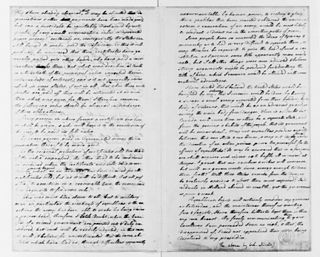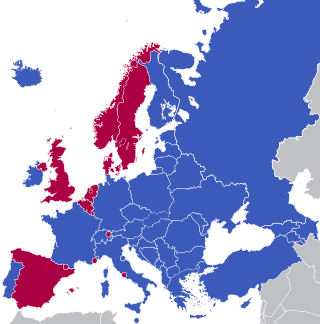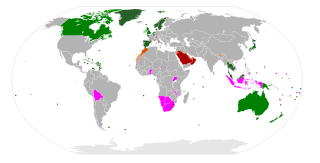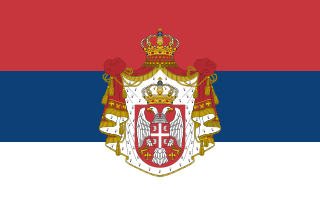
Constitutional monarchy, also known as limited monarchy, parliamentary monarchy or democratic monarchy, is a form of monarchy in which the monarch exercises their authority in accordance with a constitution and is not alone in making decisions. Constitutional monarchies differ from absolute monarchies in that they are bound to exercise powers and authorities within limits prescribed by an established legal framework.
A monarchy is a form of government in which a person, the monarch, is head of state for life or until abdication. The political legitimacy and authority of the monarch may vary from restricted and largely symbolic, to fully autocratic, and can span across executive, legislative, and judicial domains.
In political science, a reactionary or a reactionist is a person who holds political views that favor a return to the status quo ante—the previous political state of society—which the person believes possessed positive characteristics that are absent from contemporary society. As a descriptor term, reactionary derives from the ideological context of the left–right political spectrum. As an adjective, the word reactionary describes points of view and policies meant to restore a status quo ante.
A royalist supports a particular monarch as head of state for a particular kingdom, or of a particular dynastic claim. In the abstract, this position is royalism. It is distinct from monarchism, which advocates a monarchical system of government, but not necessarily a particular monarch. Most often, the term royalist is applied to a supporter of a current regime or one that has been recently overthrown to form a republic.
The abolition of monarchy is a legislative or revolutionary movement to abolish monarchical elements in government, usually hereditary.

Republicanism in the United Kingdom is the political movement that seeks to replace the United Kingdom's monarchy with a republic. Supporters of the movement, called republicans, support alternative forms of governance to a monarchy, such as an elected head of state. Monarchy has been the form of government used in the United Kingdom and its predecessor domains almost exclusively since the Middle Ages, except for a brief interruption in the years 1649–1660 during which a republican government did exist under the leadership of Oliver Cromwell.

Erik Maria Ritter von Kuehnelt-Leddihn was an Austrian-American nobleman and polymath, whose areas of interest included philosophy, history, political science, economics, linguistics, art and theology. He opposed the ideas of the French Revolution, as well as those of communism and Nazism. Describing himself as a "conservative arch-liberal" or "extreme liberal", Kuehnelt-Leddihn often argued that majority rule in democracies is a threat to individual liberties. He declared himself a monarchist and an enemy of all forms of totalitarianism, although he also supported what he defined as "non-democratic republics", such as Switzerland and the early United States. Kuehnelt-Leddihn cited the U.S. Founding Fathers, Tocqueville, Burckhardt, and Montalembert as the primary influences for his skepticism towards democracy.

Canadian republicanism is a movement for the replacement of the monarchy of Canada and a monarch as head of state with a parliamentary republic and a democratically-selected Canadian as head of state. Republicans are driven by various factors, such as a perception of inequality in the concept of excluding all but members of the royal family from the position or the argument that Canadian independence will not be achieved until Canadians can choose their own head of state independently and democratically.

The Monarchist League of Canada is a Canadian nonprofit monarchist advocacy organization. This league promotes its aims in three areas: education, advocacy, and research. Local branches and many under the patronage of lieutenant governors, complement these areas of focus by acting as a grassroots rallying point for members.

On May 22, 1782, the Newburgh letter was sent to George Washington who was camped at Newburgh, New York; written for the army officers by Colonel Lewis Nicola, it proposed that Washington should become the King of the United States. Washington reacted very strongly against the suggestion, and was greatly troubled by it.

Canadian monarchism is a movement for raising awareness of Canada's constitutional monarchy among the Canadian public, and advocating for its retention, countering republican and anti-monarchical reform as being generally revisionist, idealistic, and ultimately impracticable. Generally, Canadian monarchism runs counter to anti-monarchist republicanism, but not necessarily to the classical form of republicanism itself, as most monarchists in Canada support the constitutional variety of monarchy, sometimes referred to as a crowned republic. These beliefs can be expressed either individually—generally in academic circles—or through what are known as loyal societies, which include the Monarchist League of Canada, legions, historical groups, ethnic organizations, and sometimes police and scout bodies. Though there may be overlap, this concept should not be confused with royalism, the support of a particular monarch or dynasty; Canadian monarchists may appreciate the monarchy without thinking highly of the monarch. There have also been, from time to time, suggestions in favour of a uniquely Canadian monarch, either one headed by a descendant of the present monarch and resident in Canada or one based on a First Nations royal house.
Debate between monarchists and republicans in Canada has been taking place since before the country's Confederation in 1867, though it has rarely been of significance since the rebellions of 1837. Open support for republicanism only came from the Patriotes in the early 19th century, the Red River Métis in 1869, and minor actions by the Fenians in the 19th century. However, paralleling the changes in constitutional law that saw the creation of a distinct Canadian monarchy, the emergence in the 1960s of Quebec nationalism, and the evolution of Canadian nationalism, the cultural role and relevance of the monarchy was altered and was sometimes questioned in certain circles, while continuing to receive support in others.

In the European history, Monarchy was the prevalent form of government throughout the Middle Ages, only occasionally competing with communalism, notably in the case of the maritime republics and the Swiss Confederacy.

There are 12 monarchies in the Americas, being either sovereign states or self-governing territories that have a monarch as head of state. Each is a constitutional monarchy, wherein the monarch inherits his or her office according to law, usually keeping it until death or abdication, and is bound by laws and customs in the exercise of their powers. Ten of these monarchies are part of the global personal union known as the Commonwealth realms and share Charles III, who resides primarily in the United Kingdom, as king. The other two are the Monarchy of the Netherlands which is used in states of the Dutch Caribbean, and the Monarchy of Denmark which is used in Greenland. As such, none of the monarchies in the Americas have a permanently residing monarch, though the Commonwealth realms each have a resident governor-general to represent King Charles III and perform most of his constitutional duties in his name; and a high commissioner represents the King of Denmark and the Danish government in Greenland. Additionally, each of Canada's 10 provinces functions as a subnational constituent monarchy, with the constitutional powers vested in the King exercised at the provincial level by a lieutenant governor.

Monarchism is the advocacy of the system of monarchy or monarchical rule. A monarchist is an individual who supports this form of government independently of any specific monarch, whereas one who supports a particular monarch is a royalist. Conversely, the opposition to monarchical rule is referred to as republicanism.
The Prussian scheme refers to the rumor about a supposed suggestion in 1786 by Massachusetts politician Nathaniel Gorham that if the country adopted a constitutional monarchy like England it ought to invite Henry of Prussia, a German prince of the House of Hohenzollern, as the new king.

Monarchism in Serbia details the history of monarchist government in the country and its predecessors, and encompasses modern advocacy of restoring Serbia's form of government to a constitutional monarchy. Monarchy in Serbia was abolished after World War II with the deposition of Peter II of Yugoslavia by the new communist government of Josip Broz Tito.
Monarchism in Australia is a movement supporting the continuation of the Australian monarchy, as opposed to republicanism. The largest monarchist organisations in the country are the Australian Monarchist League and the Australians for Constitutional Monarchy.














